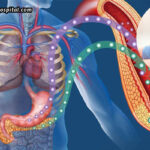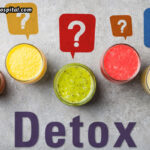With the promise of “cleaning” the liver, getting rid of toxins, and improving health, liver detox diets and cleanses have become incredibly popular in recent years. Given the abundance of “detox” products and juice cleanses on the market, it’s easy to think that our livers require a routine reset in order to remain healthy. But are these detoxification claims true? Well, the truth is that there is no need for drastic diets or supplements because the liver is actually a very effective organ that works constantly to maintain our bodies free of pollutants. This blog will dispel the myths surrounding liver detoxification and examine the true benefits of the liver as well as practical, scientifically supported methods for preserving its health.
The natural detoxifying abilities of the liver
One of the biggest and most vital organs in the body, the liver carries out a variety of essential tasks. It filters and breaks down harmful compounds from food, medications, and even the environment, acting as a processing plant for everything that enters our bloodstream. After these toxic substances are broken down, the liver either releases them into the bloodstream or aids in their removal through bile, where the kidneys eventually filter them out and excrete them. Despite what many people think, the liver can actually detoxify itself without the need of special diets or cleanses. The liver can operate at its best, removing toxins and facilitating digestion and metabolism; however, to do our part, we ought to maintain a healthy lifestyle. Let’s get into the details below.
Typical myths regarding liver detoxification
Although the liver has the capacity to detox naturally, there are many fallacies around liver cleansing. Let’s dispel some of the most widespread myths about liver detoxification.
Myth #1: Cleaning your liver requires special products
Numerous diets, supplements, and detox programs make claims about their ability to reset or cleanse the liver. These items, which range from herbal supplements to detox teas, claim to improve liver function and eliminate toxins. These assertions, however, are not well supported by scientific data. Contrary to what these items imply, the liver continuously processes and gets rid of poisons. A balanced diet and little exposure to pollutants are more beneficial to the liver than a detox.
Myth #2: The liver gets a “break” with juice cleanses
A popular detox technique, juice cleanses are said to help the liver eliminate toxins and provide a respite for the digestive system. In actuality, diets consisting solely of juice are deficient in important nutrients that are necessary for liver function, such as protein and healthy fats. Deprivation of these nutrients can really impair the liver’s capacity to function at its best. A nutrient-rich diet provides steady support for a healthy liver instead of a “break”.
Myth #3: Supplemental detox is safe and effective
Herbs like milk thistle, dandelion root, and turmeric, which are thought to promote liver health, are frequently included in detox supplements. Although studies have indicated that some of these herbs may offer health benefits, they are not miracle remedies. Additionally, several detox pills include unapproved substances that, when taken in excess, may even damage the liver. It is thus essential to always get professional medical advice before taking any supplements, especially those that are meant to support liver function.
What really supports liver health
Now that we’ve dispelled the abovementioned detox fallacies, let’s examine what actually promotes liver health. Adopting long-lasting behaviours that support general well-being and enable the liver to operate efficiently is the key to maintaining a healthy liver.
- Hydration: Maintaining adequate hydration is critical to liver health. Water reduces the liver’s stress by assisting it in eliminating toxins from the body. Try to stay hydrated throughout the day to maintain healthy liver function.
- Balanced diet: Eating a diet high in nutrients is one of the most effective techniques to assist the liver. Antioxidant, vitamin, and mineral-rich foods give the liver the resources it needs to effectively cleanse the body. Nutrients that lower inflammation and promote liver function can be found in leafy greens, citrus fruits, berries, and vibrant vegetables.
- Exercise: It has been demonstrated that regular exercise improves insulin sensitivity, which supports liver function, and reduces liver fat, particularly in people with fatty liver disease. Most days of the week, try to get in at least 30 minutes of activity, whether it be swimming, cycling, or walking.
- Sufficient sleep: The body, including the liver, heals itself during sleep. Aim for 7 to 9 hours of good sleep every night because studies have shown that sleep deprivation might affect liver function.
- Limiting alcohol: Excessive alcohol consumption is one of the leading causes of liver disease. Reducing or avoiding alcohol can significantly lower the risk of liver inflammation, fatty liver, and cirrhosis, making it one of the most effective ways to protect the liver.
Foods that support liver health
Certain foods can provide added benefits to the liver, helping it perform at its best. Here are some evidence-based foods that can support liver function:
- Leafy greens: Spinach, kale, and arugula are high in antioxidants and can help reduce liver inflammation.
- Cruciferous vegetables: Vegetables like broccoli and cauliflower contain compounds that support liver enzymes, aiding detoxification.
- Coffee: Research indicates that by lowering fibrosis and inflammation, coffee may reduce the incidence of liver disease.
- Green tea: Well-known for having a high antioxidant content, green tea may help lower liver fat and prevent liver damage.
- Nuts and fatty fish: Omega-3 fatty acid-rich foods, like salmon and walnuts, help lower liver fat levels and lessen inflammation in the liver.
- Berries: Blueberries and cranberries are rich in antioxidants that reduce oxidative stress in the liver.
Practical tips for long-term liver health
Adopting long-term behaviours rather than short-term cleanses is the key to supporting liver function. The following useful advice can help you keep your liver healthy in the long run:
- Avoid processed foods: Steer clear of processed foods because they raise the risk of fatty liver disease by causing the accumulation of liver fat. Eat as many whole, unprocessed foods as you can.
- Reduce toxin exposure: To minimize exposure to toxins, abstain from smoking, use natural alternatives whenever possible, and minimize the use of harsh cleaning products.
- Reduce stress: Prolonged stress can put a strain on the liver, so reduce stress by engaging in regular exercise, yoga, or meditation.
- Frequent checkups: By measuring liver enzymes, routine blood tests can help identify liver problems early and enable prompt treatment.
To conclude, expensive cleanses or rigorous diets are not necessary for liver detoxification. As long as a healthy lifestyle is maintained, the liver is a robust organ that can naturally detoxify itself. You can make sure your liver works at its best by maintaining proper hydration, eating a balanced diet, avoiding alcohol, and exercising frequently. Rather than seeking short-term solutions, make a commitment to long-term routines that will improve your liver and your general health. Remember that taking good care of your liver every day is the most effective way to protect it before attempting any supplements or detox solutions.
Final note: Routine examinations with a liver specialist can offer important information to people who are at risk or are worried about their liver health. Consider speaking with a liver specialist for personalized advice on maintaining liver health and addressing any concerns. Mission Gastro liver hospital in Ahmedabad is a renowned healthcare facility specializing in comprehensive liver care. With a team of expert liver specialists, the hospital offers advanced treatments, diagnostics, and personalized care for optimal liver health.








